Mysterious Mamberamo
The Mamberamo River is situated in the east-west forest of Papua. For many years this area has been almost totally closed off. Many maps mark the basin of the river Mamberamo as „Strictly prohibited territory“. Mysterious Mabreamo Photo©JahodaPetr.com (Papua guide)
Mysterious Mabreamo Photo©JahodaPetr.com (Papua guide)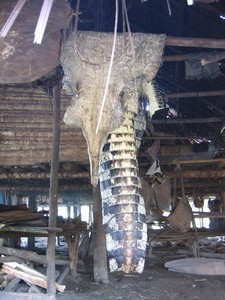 Mamberamo crocodiles Photo©JahodaPetr.com (Papua guide)
Mamberamo crocodiles Photo©JahodaPetr.com (Papua guide)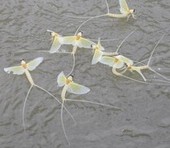 Mamberamo River Photo©JahodaPetr.com (Papua guide)
Mamberamo River Photo©JahodaPetr.com (Papua guide)We have tips concerning several promising areas in the vicinity of Mamberamo River.
Our trips to Mamberamo fall into the category of first contact expeditions. It is not actually the first contact with people living in this area, because missionaries operate here as well. However, tourists get there very rarely and we want to penetrate areas which are outside the sphere of influence of the missionaries anyway. These might be a real first contact expeditions with everything you might expect from it. Are you prepared for the challenge?Mamberamo – West Papua – Vano Tribe – stone axe makers – Harrers´Ja-li-me
 Mamberamo – Vano Photo©JahodaPetr.com(Papua guide)
Mamberamo – Vano Photo©JahodaPetr.com(Papua guide)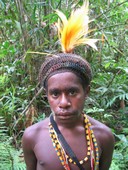 Mamberamo – Vano Photo©Petr Kožela
Mamberamo – Vano Photo©Petr Kožela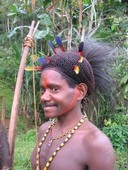 Mamberamo – Vano Photo©JahodaPetr.com (Papua guide)
Mamberamo – Vano Photo©JahodaPetr.com (Papua guide)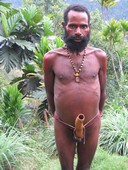 Mamberamo – Vano Photo©Petr Kožela
Mamberamo – Vano Photo©Petr Kožela Mamberamo – Vano Photo©Petr Kožela
Mamberamo – Vano Photo©Petr Kožela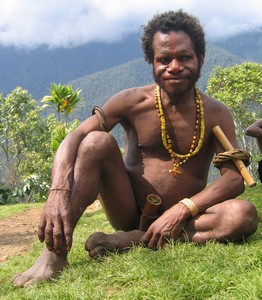 Mamberamo – Vano tribe Photo©Petr Kožela
Mamberamo – Vano tribe Photo©Petr KoželaOn this island lies the legendary village Ja-li-me (The spring of stone axes). Heinrich Harrer writes about this village in his book “Coming from the Stone Age”. Up to the present day Wana men wear kotekas, and women wear skirts made of grass.
 Mamberamo – Vano breaking rock by fire. The stone will be used to manufacture axes.Photo©JahodaPetr.com (Papua guide)
Mamberamo – Vano breaking rock by fire. The stone will be used to manufacture axes.Photo©JahodaPetr.com (Papua guide)No sooner than the next day does the difficult and lengthy treatment of the future stone axes begin. The stone has to be broken first. This process begins by throwing a big stone on a block, which was previously cast loose from the rock. Then they proceed by smashing (cleaving) the stones into the approximate shape of the future axe heads. In the end, the stone is sharpened against other stones (or sometimes by them).
This is one of the very last places where you can actually see how stone axes are made. Perhaps this is the last place in the world where production of stone axes is an every day event. For how long will this custom preserve? How long will it take till the stone axes will be replaced by more powerful steel axes or perhaps chain-saws? I would like to say that it will happen in the distant future, but I would be lying…
Ja-li-me (The Spring Of Stone Axes) and Vano tribe which Heinrich Harrer writes about are still there. Vano tribe lives its traditional way of life and Vano tribesmen manufacture their stone axes in the very same way which was described by Heinrich Harrer in his book. New photos that we have made during our expeditions in the third millenium are very similar to those brought by Heinrich Harrer in 1962. We have reached the same Ja-li-me as he did some fourty years ago. However, we have managed to reach the tribe in much simpler and safer way.
West Papua – The warriors of the Mamberamo river
The warriors of the Mamberamo river wear skirts with a „tail“ in the back, and cone-shaped grass hats decorated by casuar feathers. They are always armed with unusually large bows and arrows. Mamberamo people Photo©JahodaPetr.com (Papua guide)
Mamberamo people Photo©JahodaPetr.com (Papua guide)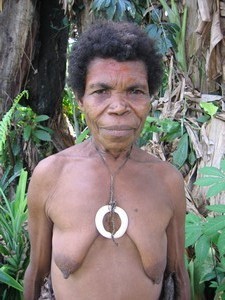 Mamberamo people Photo©JahodaPetr.com (Papua guide)
Mamberamo people Photo©JahodaPetr.com (Papua guide) Mamberamo people Photo©JahodaPetr.com (Papua guide)
Mamberamo people Photo©JahodaPetr.com (Papua guide)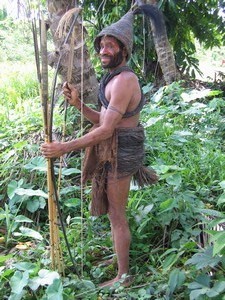 Mamberamo people Photo©JahodaPetr.com (Papua guide)
Mamberamo people Photo©JahodaPetr.com (Papua guide)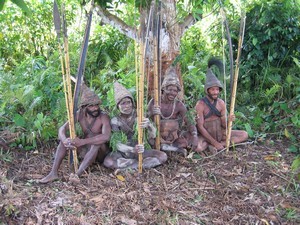 Mamberamo people Photo©JahodaPetr.com (Papua guide)
Mamberamo people Photo©JahodaPetr.com (Papua guide)One can only note: strange clothes, strange people, and a strange, mysterious river named Mamberamo, on the strange New Guinea Island, in an even stranger area, Papua (Irian Jaya).
No comments:
Post a Comment